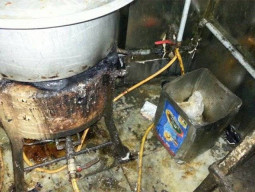
According to data collected by the Edhi Ambulance service, at least 19 accidents took place in Phase VIII last month alone. Most of these were not reported to the police as there were no fatal injuries.
The smaller arteries are the most vulnerable in terms of accidents due to the blind corners. However, major roads such as the Khayaban-e-Ittehad and Khayaban-e-Shamsheer are equally exposed. “Most accidents occur around Phase IV, VI and VIII, perhaps due to the high volume of traffic on these roads,” said Abdul Rashid, an Edhi ambulance driver who operates in the area. “Another reason could be that the traffic lights have been out of order since a long time.”
A survey of some of the main intersections at Khayaban-e-Badr, Roomi, Khalid, Iqbal and Qasim showed that almost 80 per cent of the traffic signals were out of order.
Other commercial zones that witness high volumes of traffic such as Khayaban-e-Rahat and Bukhari also pose a high risk for motorists due to the absence of functional signals.
The contractor
The Cantonment Board Clifton (CBC) and the private contractor, who was awarded the contract for the traffic signals in DHA, blame each other for the chaos.
The contractor, Zafar Naveed, told The Express Tribune that they have been struggling with a financial crisis as the CBC has not settled their dues since some time now. “The CBC is apparently engaged in other functions and does not pay heed to the traffic signals that provide them no financial benefit.”
According to Naveed, of the 54 traffic signals in DHA, 42 are partially functional while the rest are out of order. “You can say that around 98 per cent of the traffic signals are malfunctioning,” he said.
“We had advised the CBC to install at least 15 more signals, especially in DHA Phase VIII,” he revealed. “But the authorities have yet to heed our requests.”
Naveed was of the belief that Khayaban-e-Shaheen was the most dangerous street in DHA, in terms of traffic accidents, but the CBC was still deliberating whether to install traffic signals on the street or not.
Due to the area’s proximity with the sea, the traffic signals require a lot of maintenance as the salty breeze and heavy moisture adversely affect their functioning. “The CBC, however, instead of releasing extra funds to renovate these signals, stop paying our dues,” he claimed. “Our staff does not want to do the work anymore because of the constant salary crisis.”
The CBC’s version
For his part, the CBC vice-president, Aziz Suharwardy, refuted all the allegations leveled by the contractor, claiming that the latter had not maintained or installed new traffic signals since the past year and a half. “Why should we pay them when they have not done anything at all?” he questioned.
According to Suharwardy, the company was based in Punjab and did not seem to care for the development in Karachi as they already had plenty of contracts in their home province. He claimed that the company had signed the contract with the DHA, while the CBC had later inherited the responsibility for the care of signals. This legal issue remains a point of contention.
“We have been trying to change the contractor for traffic and will soon issue a tender in this regard,” he said. “Hopefully, the problem will be resolved after that.”
Published in The Express Tribune, September 16th, 2014.

1729161093-0/liam-(4)1729161093-0-165x106.webp)


1732603002-0/lamar-(4)1732603002-0-165x106.webp)












COMMENTS
Comments are moderated and generally will be posted if they are on-topic and not abusive.
For more information, please see our Comments FAQ